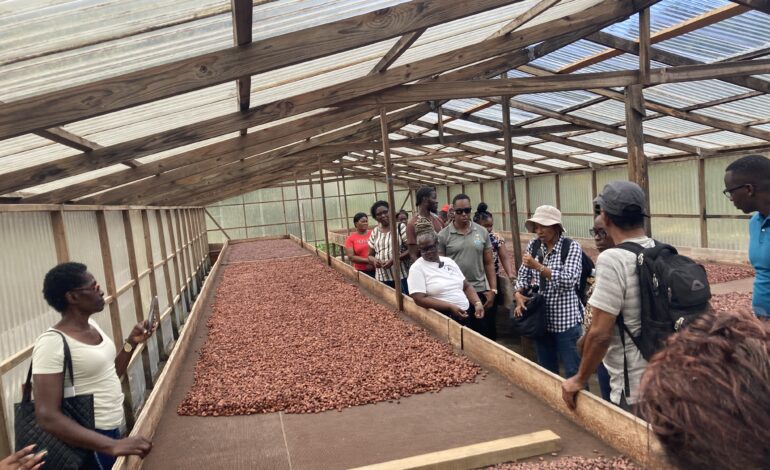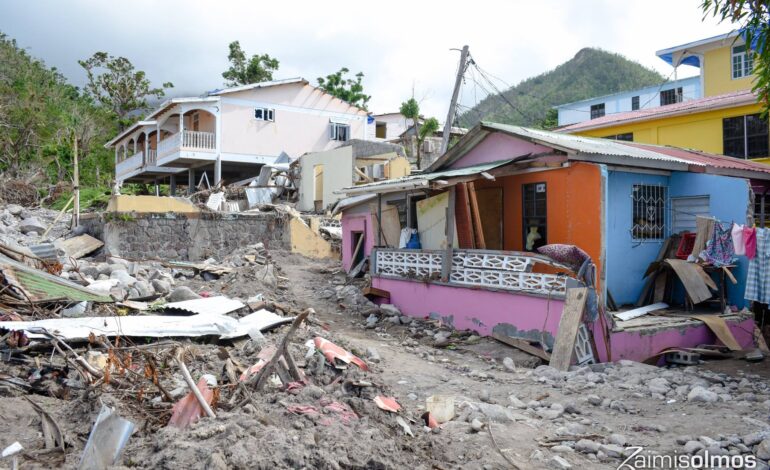
28 participants improved their post-harvest processes and quality management skills at the three-day training
St. George’s, Grenada – April 16, 2025 – Enhancing the post-harvest processes of cocoa in Grenada along with uncovering its full, maximum diverse and complex flavors were the objectives behind the recent collaborative training between the Food and Agriculture Organization of the United Nations (FAO), and the Ministry of Agriculture & Lands, Forestry, Marine Resources & Cooperatives of Grenada. The participants comprised of cocoa farmers, agro-processors and extension officers who gathered at the T.A. Marryshow Community College in Mirabeau, St. Andrew from March 10 – 12, 2025, for the scale-out activities of the FAO Project “Capacity Building Related to Multilateral Environmental Agreements in ACP Countries – Phase III”, in alignment with the FAO project “Strengthening the Foundations for a Specialty Cocoa Sector in the Caribbean”.
In effort to preserve the quality and maximize the potential of the cocoa flavor profiles in Grenada, the training, which was facilitated by Ms Sarah Bharath, Cocoa Post-Harvest Specialist with FAO, focused on appropriate post-harvest and processing methods and techniques for cocoa, such as drying, fermentation, and storage procedures that influence flavor development and overall bean quality. She led the participants on a sensory analysis journey during the practical sessions, enabling them to evaluate the smell, taste, and visual attributes of cocoa liquor. This hands-on evaluation aimed to deepen their understanding of how to identify key fermentation characteristics, detect off-flavors, and apply principles of quality management. Participants also examined cocoa beans having undergone different post-harvest processes to recognize desired characteristics, particularly those used in producing cocoa sticks, a staple for cocoa teas in Grenada.
The workshop provided a platform for knowledge sharing and networking among cocoa farmers, processors, extension officers, and industry stakeholders, all of whom committed to improving post-harvest management techniques to enhance the quality of cocoa for both local and international markets, including Ms Frances McLean, cocoa farmer and agro-processor. She stated, “As a cocoa farmer and agro-processor, this training was very enlightening, offering firsthand insight in ways to improve quality management, including food safety and sanitation in kitchen areas. As a cottage industry operator, it’s essential to be aware of all potential contamination risks and take steps to ensure proper hygiene and quality standards”.
Fellow participant and cocoa agro-processor, Ms Yoland Smith highlighted that, “We learnt about the different fermentation process techniques firsthand, and it was good to see it from one stage to the other during the field visit at Belmont Estate. I also enjoyed the sensory analysis sessions, where we learned how to recognize the smell, texture, color and taste of cocoa liquor for different stages of fermentation. I already had knowledge and experience of all the cocoa post-harvest processes and my expectation for this training was high. What was delivered was even higher than I imagined”.
Anne Desrochers, Plant Production and Protection Specialist with FAO, was pleased with the success of the training. She stated, “We were here to learn from each other, to share knowledge not only from the trainer, but also from the participants and build a strong network to support the entire value chain. The aim of our training workshops and other initiatives in Dominica, Grenada and Saint Vincent and Grenadines has been to build awareness about the importance of quality, starting from the ground up, literally, from the soil, through production, post-harvest and processing, to the final cocoa products”. She added that most of the participants were cocoa stick makers – a local product in high demand in Grenada which is used to make cocoa tea, a traditional beverage enjoyed for comfort, health, and part of daily life and cultural tradition of Grenadians.






